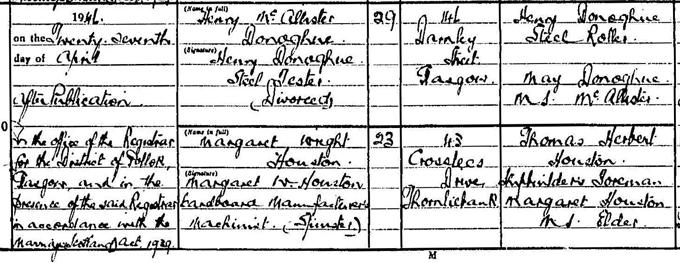More than 138,500 new online images have been released on the Scotland's People website consisting of 262,978 birth, death and marriage register entries. You can search for, view and save images of these entries on Scotland's People.
In 1946 there were 45,851 marriages celebrated in Scotland. Whilst this was 2,877 fewer than the previous year, it was the highest number registered in Scotland in any year prior to the outbreak of the Second World War in 1939 since statutory registration began in 1855.
Of all the marriages registered during 1946, the vast majority, 38,281, were solemnised by a minister of religion. 7,565 (or 16.5% of the total number) were civil marriages contracted under the provisions of the Marriage (Scotland) Act 1939. A further 15 were registered following a Decree of Declarator by the Court of Session. This was a formal recognition of marriage ‘by cohabitation with habit and repute.’
Henry McAllister Donoghue was one of the thousands of people married this year. On 27th April he married Margaret Wright Houston in the Register Office in Pollock.

The wedding entry of Henry McAllister Donoghue and Margaret Wright Houston.
Crown copyright, National Records of Scotland (NRS), Statutory Register of Marriages, 1946, 644/18 340 page 170.
Henry was the son of May Donoghue who brought an action to the Court of Session: Donoghue v Stevenson which became a landmark case. On 26th August 1928 May had visited Wellmeadow café in Paisley with a friend. After enjoying the majority of a bottle of ginger beer, she poured the last of the contents into a glass and watched in horror as a snail fell out with the liquid.
May brought an action against the manufacturer of the ginger beer, David Stevenson, for the shock caused by the discovery of the snail, illness (gastro-enteritis which required a stay at Glasgow Royal Infirmary) and consequent lack of earnings. This case (NRS, CS252/2299) was ground breaking in Scots law and established the law of ‘delict’. For the first time in Scottish legal history a manufacturer could be held responsible for the quality of their product, even though they had no direct contact or contract with the consumer.
David Stevenson appealed against this in the Court of Session in 1931. Four judges declared that the manufacturer could not be held responsible for something that happened to a person who had no immediate contact or contract with them.
In return, May approached the House of Lords to appeal this decision in order to pursue Stevenson for compensation. The appeal was heard in London but by this time the manufacturer had died and compensation was eventually agreed out of court in 1934.
May McAllister had married Henry Donoghue in February 1916. Months later, on 25th July, their son Henry was born at 29 Webster Street, Glasgow. As an adult, Henry junior worked as a shipyard worker in Glasgow and, on 20th July 1937, he married his first wife, Lorna Nelson.
In 1944 Henry had a son, also called Henry, who had been conceived in an extra-marital relationship, with Margaret Wright Houston. Margaret was an electric crane driver and the daughter of Thomas Herbert Houston, shipbuilder’s foreman and Margaret Elder.
Two years later, in January 1946, Henry and Lorna divorced, allowing Henry to marry Margaret in the April. Twin daughters, Elizabeth and May, were born in 1952.
The couple divorced in 1981. Margaret died in 1994 in Glasgow. Henry died in 2003 in Bournemouth, England.
To discover more about the statutory register of marriages, please see our online guide. Further details about the snail in the bottle case can be found in our Scottish Archives for Schools article.